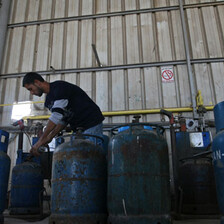The Electronic Intifada 14 August 2009
CAIRO (IPS) - Opposition figures and political activists have slammed a new deal to sell Egyptian liquefied natural gas (LNG) to Israel at what they say are vastly reduced prices.
“Egyptian gas is being sold to Israel at prices far below the international average,” Ibrahim Yosri, former head of legal affairs and treaties at the Egyptian Foreign Ministry told IPS. “This agreement is proof that the ruling regime is unconcerned with public opinion and is insistent on depriving the Egyptian public of its rightful national assets.”
On 28 July, Egypt formally agreed to sell between 12.5 billion and 16 billion cubic meters of LNG per year to Israel for a period of between 17 and 22 years. The Cairo-based Egyptian-Israeli energy consortium Egyptian Mediterranean Gas (EMG) will supply the gas to Israeli firm Dorad Energy for a total reported cost of between $2.1 billion and $3.3 billion.
Given longstanding popular condemnation of Israeli policies, particularly those relating to Palestinian populations in the Gaza Strip and occupied West Bank, the deal also stirred political controversy.
“It is absolutely forbidden that we support a country currently at war with Islam and Muslims, and which occupies the land of Palestine,” Nasr Farid Wassil, former Grand Mufti of the republic, was quoted as saying in the independent press. “All economic relations with such a country should be severed.”
Despite its unpopularity, the deal is not the first: under an earlier energy accord, Egypt has been exporting LNG to Israel since May of last year. Extracted from fields in Egypt’s northern Sinai Peninsula, gas is pumped via submarine pipeline from the coastal town al-Arish to the Israeli port city Ashkelon.
The first accord, signed in 2005, allowed EMG to sell 1.7 billion cubic meters of LNG annually to the Israeli state-run Israel Electric Corporation for a period of 15 years. The sale price was never officially disclosed, fueling speculation by critics that gas was being sold to Israeli buyers at reduced prices.
Egypt is one of the few Arab states, along with Jordan and Mauritania, to have full diplomatic relations with Israel. Nevertheless, bilateral cooperation has remained severely hampered by popular disapproval of Israeli policies.
Over recent years, public opinion has hardened further against the self- proclaimed Jewish state in light of the latter’s ongoing blockade of the Gaza Strip, which shares a 14-kilometer border with Egypt. The Egyptian public was outraged by Israel’s three-week assault on the Gaza Strip December-January, which left more than 1,500 dead and more than 5,000 injured.
A popular campaign was launched in summer last year to oppose all LNG export deals.
“Egyptian natural gas belongs to the Egyptian people, not the government,” Mohammed Anwar al-Sadat, former MP and spokesman for the Popular Campaign against Gas Exports, told IPS at the time. “If they’re going to sell it, they should at least sell it at international prices.”
Formation of the popular committee was accompanied by a lawsuit filed by Yosri and a number of political activists against export of gas to Israel.
“All studies, official and independent, indicate that Egypt is in dire need of its energy resources for its own future development,” said Yosri. “What’s more, the current sales price is far too low.”
Last November, an Administrative Court ruled in favor of Yosri and his co-plaintiffs. Citing lack of parliamentary approval and the vagueness of the agreement, the court ordered a ban on export of Egyptian LNG to Israel.
But the government filed an appeal, and Egypt’s Supreme Administrative Court ruled in February to freeze implementation of the earlier verdict, pending further deliberations.
Responding to claims that gas was being sold at less than competitive prices, the government announced its intention to revise the terms of the agreement. Petroleum Minister Sameh Fahmy promised parliament in June that the government would “review all gas export agreements to all countries, including Israel.”
Days after the new gas deal was signed, President Hosni Mubarak announced that the government had “made revisions and amendments of current gas contracts with all countries in order to maximize profit for Egypt.” Quoted in the 4 August edition of state daily Al-Ahram, he stressed that “Egypt is not selling gas to Israel at reduced prices, as some are claiming.”
But energy expert Ibrahim Zahran, member of the campaign against gas exports, says the gas “was under-priced in the first deal, and continues to be under-priced in the new agreement as well.
“The first deal laid down a price of $1.25 per million British thermal units (BTUs), compared to global prices of about $15 per million BTUs,” Zahran told IPS. “Under the new agreement, the price was raised to $1.75 per million BTUs, although international prices remain the same: Russia, for example, currently sells gas to next-door Ukraine at $15 per million BTUs.
“At such vastly reduced prices, Egypt is effectively subsidizing Israel,” he added.
Final deliberations in the legal case are scheduled to begin at the Supreme Administrative Court in October. Yosri says he will challenge the terms of the new agreement as well.
All rights reserved, IPS - Inter Press Service (2009). Total or partial publication, retransmission or sale forbidden.


